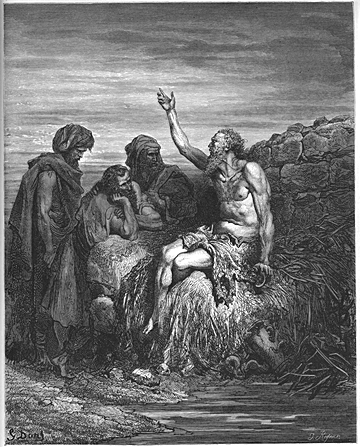Job 2
1 Ó sì tún di ọjọ́ kan nígbà tí àwọn ọmọ Ọlọ́run wá síwájú Olúwa, Satani sì wá pẹ̀lú wọn láti pe níwájú Olúwa.
Forsothe it was doon, whanne in sum dai the sones of God `weren comun, and stoden bifor the Lord, and Sathan `was comun among hem, and stood in his siyt,
2 Olúwa sì bi Satani pé, “Níbo ni ìwọ ti wá?” Satani sì dá Olúwa lóhùn pé, “Láti lọ síwá sẹ́yìn lórí ilẹ̀ ayé àti ní ìrìnkèrindò nínú rẹ̀.”
that the Lord seide to Sathan, Fro whennus comest thou? Which answeride, and seide, Y haue cumpassid the erthe, `and Y haue go thury it.
3 Olúwa sì wí fún Satani pé, “Ìwọ ha kíyèsi Jobu ìránṣẹ́ mi, pé, kò sí ẹni tí ó dàbí rẹ̀ ní ayé, ọkùnrin tí ń ṣe olóòtítọ́ tí ó sì dúró ṣinṣin, ẹni tí ó bẹ̀rù Ọlọ́run, tí ó sì kórìíra ìwà búburú, bẹ́ẹ̀ ni ó sì di ìwà òtítọ́ rẹ̀ mu ṣinṣin, bí ìwọ tilẹ̀ ti dẹ mí sí i láti run ún láìnídìí.”
And the Lord seide to Sathan, Whethir thou hast biholde my seruaunt Joob, that noon in erthe is lijk hym; he is a symple man, and riytful, and dredynge God, and goynge awei fro yuel, and yit holdynge innocence? `But thou hast moued me ayens him, that `Y schulde turmente hym in veyn.
4 Satani sì dá Olúwa lóhùn wí pé, “Awọ fún awọ; àní ohun gbogbo tí ènìyàn ní, òun ni yóò fi ra ẹ̀mí rẹ̀.
To whom Sathan answeride, and seide, `A man schal yyue skyn for skyn, and alle thingis that he hath for his lijf;
5 Ṣùgbọ́n nawọ́ rẹ nísinsin yìí, kí ó tọ́ egungun rẹ̀ àti ara rẹ̀, bí kì yóò sì bọ́hùn ní ojú rẹ.”
`ellis sende thin hond, and touche his boon and fleisch, and thanne thou schalt se, that he schal curse thee in the face.
6 Olúwa sì wí fún Satani pé, “Wò ó, ó ń bẹ ní ìkáwọ́ rẹ, ṣùgbọ́n dá ẹ̀mí rẹ̀ sí.”
Therfor the Lord seide to Sathan, Lo! he is in `thin hond; netheles kepe thou his lijf.
7 Bẹ́ẹ̀ ni Satani jáde lọ kúrò níwájú Olúwa, ó sì sọ Jobu ní oówo kíkankíkan láti àtẹ́lẹsẹ̀ títí dé àtàrí rẹ̀.
Therfor Sathan yede out fro the face of the Lord, and smoot Joob with `a ful wickid botche fro the sole of the foot `til to his top;
8 Ó sì mú àpáàdì, ó fi ń họ ara rẹ̀, ó sì jókòó nínú eérú. (questioned)
which Joob schauyde the quytere with a schelle, `and sat in the dunghil.
9 Nígbà náà ni aya rẹ̀ wí fún un pé, “Ìwọ di ìwà òtítọ́ mú síbẹ̀! Bú Ọlọ́run, kí ó sì kú!”
Forsothe his wijf seide to hym, Dwellist thou yit in thi symplenesse? Curse thou God, and die.
10 Ṣùgbọ́n ó dá a lóhùn pé, “Ìwọ sọ̀rọ̀ bí ọ̀kan lára àwọn aṣiwèrè obìnrin ti í sọ̀rọ̀; há bà! Àwa yóò ha gba ìre lọ́wọ́ Ọlọ́run, kí a má sì gba ibi?” Nínú gbogbo èyí, Jobu kò fi ètè rẹ̀ ṣẹ̀.
And Joob seide, Thou hast spoke as oon of the fonned wymmen; if we han take goodis of the hond of the Lord, whi forsothe suffren we not yuels? In alle these thingis Joob synnede not in hise lippis.
11 Nígbà tí àwọn ọ̀rẹ́ Jobu mẹ́ta gbúròó gbogbo ibi tí ó bá a, wọ́n wá, olúkúlùkù láti ibùjókòó rẹ̀; Elifasi, ara Temani àti Bilidadi, ará Ṣuhi, àti Sofari, ará Naama: nítorí pé wọ́n ti dájọ́ ìpàdé pọ̀ láti bá a ṣọ̀fọ̀, àti láti ṣìpẹ̀ fún un.
Therfor thre frendis of Joob herden al the yuel, that hadde bifelde to hym, and camen ech man fro his place, Eliphath Temanytes, and Baldach Suythes, and Sophar Naamathites; for thei `hadden seide togidere to hem silf, that thei wolden come togidere, and visite hym, and coumforte.
12 Nígbà tí wọ́n gbójú wọn wò ní òkèrè réré, tí wọ́n kò sì mọ̀ ọ́n, wọ́n gbé ohùn wọn sókè, wọ́n sọkún: olúkúlùkù sì fa aṣọ ìgúnwà rẹ̀ ya, wọ́n sì ku erùpẹ̀ sí ojú ọ̀run, wọ́n sì tẹ́ orí gbà á.
And whanne thei hadden reisid afer `her iyen, thei knewen not hym; and thei crieden, and wepten, and to-renten her clothis, and spreynten dust on her heed `in to heuene.
13 Bẹ́ẹ̀ ni wọ́n jókòó tì í ní inú erùpẹ̀ ní ọjọ́ méje ti ọ̀sán ti òru, ẹnikẹ́ni kò sì bá a sọ ọ̀rọ̀ kan, nítorí tí wọ́n ti rí i pé ìbànújẹ́ rẹ̀ pọ̀ jọjọ.
And thei saten with hym in the erthe seuene daies and seuene nyytis, and no man spak a word to hym; for thei sien, that his sorewe was greet.





















